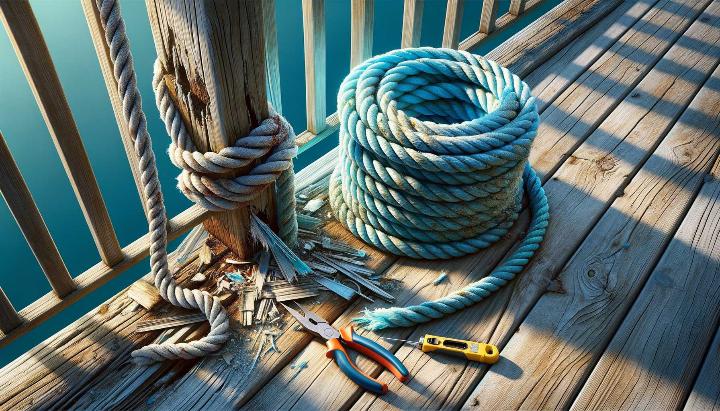Have you ever found yourself in a situation where choosing the wrong rope could mean the difference between success and disaster? Whether you're a seasoned sailor, a construction foreman, or an adventurous rock climber, understanding rope specs is crucial. Today, we're diving into the world of 2 inch poly rope, a versatile workhorse that's revolutionising industries across the globe.
Imagine securing a multi-million dollar yacht with a flimsy clothesline or attempting to scale a sheer cliff face with a garden hose. Sounds absurd, right? Yet, many professionals and enthusiasts unwittingly put themselves at risk by overlooking the importance of proper rope selection. That's where our expertise at iRopes comes in handy.
In this comprehensive guide, we'll unravel the mysteries of rope specifications, explore the unique characteristics of 2 inch poly rope, and showcase its myriad applications across various industries. From marine endeavours to construction projects, and even fitness routines, you'll discover why this robust cordage has become the go-to choice for those who demand the best.
So, whether you're looking to upgrade your equipment or simply curious about the science behind high-performance ropes, buckle up. We're about to embark on a journey that will transform the way you think about these essential tools, ensuring you're always equipped with the right rope for the job.
Understanding Rope Specifications
Have you ever wondered why some ropes feel different in your hands or perform better in certain situations? The secret lies in understanding rope specifications. Let's dive into the world of rope specs and unravel the mystery behind these essential measurements.
Key Rope Measurements: Diameter, Length, and Weight
When I first started rock climbing, I was overwhelmed by the variety of ropes available. One of the most noticeable differences was the thickness of the ropes. This is where diameter comes into play.
- Rope diameter is measured in millimeters and significantly affects a rope's weight and strength. Thicker ropes are generally stronger but heavier, while thinner ropes are lighter but may have less durability.
- Length is crucial for specific applications. For instance, a 60-meter rope might be perfect for most sport climbing routes, but you'd need a longer rope for big wall climbing.
- Weight impacts how the rope handles and how much effort it takes to carry. Lighter ropes are great for long approaches, but they might sacrifice some durability.
Rope Strength Factors: Tensile Strength vs Working Load
Understanding the difference between tensile strength and working load is crucial for safety. I learned this the hard way when I mistakenly used a rope beyond its recommended working load during a construction project.
Never exceed a rope's working load limit, as it could lead to catastrophic failure and serious injury.
Tensile strength is the maximum load a rope can handle before breaking, tested under laboratory conditions. However, in real-world applications, we use the working load limit, which is typically a fraction of the tensile strength to ensure a safety margin.
Specialized Rope Specs: Static and Dynamic Elongation
For activities like climbing or fall protection, understanding static and dynamic elongation is crucial. These specifications determine how much a rope stretches under different conditions.
- Static elongation measures how much a rope stretches under a constant load. This is important for activities where you don't want the rope to bounce, like rappelling or hauling gear.
- Dynamic elongation refers to how much a rope stretches during a fall. This property is critical in climbing ropes, as it helps absorb the shock of a fall and reduce the impact force on the climber.
By understanding these rope specifications, you can make informed decisions about which rope to use for your specific needs. Whether you're scaling a cliff face or securing a load on a truck, knowing your rope specs ensures safety and optimal performance. Remember, when in doubt, always consult with rope specialists or manufacturers like iRopes for expert advice tailored to your unique requirements.
2 Inch Poly Rope: Features and Applications
Have you ever marvelled at the strength and versatility of a thick, sturdy rope? As someone who's spent years working with various types of cordage, I can tell you that 2 inch poly rope is a true workhorse in the world of ropes. Let's dive into what makes this robust rope so special and why it's become a go-to choice for many industries.
Characteristics of 2 Inch Polypropylene Rope
When you first handle a 2 inch poly rope, you'll immediately notice its substantial girth and surprisingly light weight. This combination of size and manageable heft is just the beginning of its impressive features:
- Lightweight yet strong: Despite its thickness, polypropylene rope floats on water and is easier to handle than you might expect.
- Excellent durability: Resistant to rot, mildew, and many chemicals, this rope stands up to harsh environments.
- UV stabilised: Unlike some materials that degrade quickly in sunlight, poly rope maintains its strength even with prolonged sun exposure.
- Water-resistant: Its ability to repel water makes it ideal for marine applications and wet conditions.

Compared to nylon or polyester ropes of similar size, 2 inch poly rope offers unique advantages. While nylon might be more elastic and polyester more resistant to stretching, polypropylene strikes a balance with its floating ability and cost-effectiveness.
Common Uses for 2 Inch Poly Rope
The versatility of 2 inch poly rope makes it a favourite across various industries. Here are some common applications where this heavy-duty synthetic rope shines:
- Marine and boating: From mooring large vessels to creating safety barriers, its floating property is invaluable on the water.
- Construction: Used for hoisting materials or creating temporary barriers on building sites.
- Agriculture: Ideal for securing loads on trucks or as sturdy hay bale ties. For more options, explore different types of plait ropes.
- Recreational activities: Think of climbing walls, obstacle courses, or even as battle ropes in gyms.
In my experience, the versatility of 2 inch poly rope never ceases to amaze me. I once saw it ingeniously used to create a makeshift zip line at a children's camp - talk about thinking outside the box!
Always check the working load limit of your 2 inch poly rope before use. While it's strong, exceeding its capacity can lead to dangerous situations.
Understanding the characteristics and applications of 2 inch poly rope is crucial for making informed decisions about rope selection. Whether you're securing a large boat or setting up a construction site, this versatile rope might just be the solution you're looking for. Remember, when in doubt about which rope best suits your needs, don't hesitate to consult with rope specialists who can provide tailored advice for your specific application. Discover more about versatile uses of polypropylene ropes in various industries here.
Common Applications of 2 Inch Poly Rope
As someone who's spent years working with various types of cordage, I can't help but marvel at the versatility of 2 inch poly rope. Its unique combination of strength, water-resistance, and buoyancy makes it a go-to choice for a wide range of industries. Let's explore some of the most common applications where this robust rope truly shines.
Marine and Fishing Industry Uses
The marine world is where 2 inch poly rope really makes waves. Its ability to float and resist water absorption makes it an ideal choice for numerous nautical applications.
- Anchor and dock lines: The rope's strength and durability make it perfect for securing vessels of various sizes.
- Towing ropes: Its shock-absorbing properties help reduce stress on both the towing and towed vessels.
- Commercial fishing gear: From crab pots to lobster traps, 2 inch poly rope withstands the harsh marine environment.
I once witnessed a small fishing boat weather a sudden storm thanks to the reliability of its poly rope mooring lines. It's moments like these that truly highlight the importance of quality marine ropes. For more insights into marine rope applications, explore our guide on marine rope specifications and uses.

Construction and Industrial Applications
The construction industry has also embraced the benefits of 2 inch poly rope, utilising its strength and versatility in various ways:
- Safety barriers: The high visibility of coloured poly rope makes it ideal for creating temporary safety cordons on construction sites.
- Heavy-duty rigging: Its impressive strength-to-weight ratio makes it suitable for lifting and securing heavy loads.
- Material handling: In warehouses and factories, 2 inch poly rope is often used for bundling and transporting materials.
During a recent visit to a construction site, I was impressed to see how efficiently workers used poly rope to hoist materials to upper floors. Its durability and resistance to abrasion make it a cost-effective choice for such demanding tasks. Discover more about rope types for construction projects with our construction rope guide.
Recreational and Sports Uses
Beyond industrial applications, 2 inch poly rope has found its way into various recreational and sports activities:
- Climbing walls: Its strength and low stretch properties make it suitable for creating durable climbing routes.
- Obstacle courses: The rope's versatility allows for creative and challenging course designs.
- Fitness equipment: Ever tried battling ropes at the gym? There's a good chance they were made from 2 inch poly rope.
Have you ever considered how many different ways you might encounter 2 inch poly rope in your daily life? From the marina to the construction site, and even at your local gym, this versatile cordage plays a crucial role in countless applications.
When selecting 2 inch poly rope for your specific needs, always consider factors such as UV resistance, colour-fastness, and working load limits. Consulting with rope specialists like iRopes can help ensure you choose the right product for your application.
As we've seen, the applications for 2 inch poly rope are nearly endless. Its unique properties make it a versatile solution for a wide range of industries and activities. Whether you're securing a yacht, setting up a construction site, or designing a fitness challenge, this robust rope is up to the task. Remember, choosing the right rope for your specific needs is crucial, so don't hesitate to seek expert advice when making your selection.
Choosing the Right 2-Inch Poly Rope for Your Needs
When it comes to selecting the perfect 2-inch poly rope for your project, the choices can be overwhelming. As someone who's spent years working with various types of cordage, I can tell you that making the right choice is crucial for both safety and performance. Let's dive into the world of 2-inch poly ropes and uncover the secrets to choosing the ideal rope for your specific needs.
Types of 2-Inch Poly Ropes and Their Properties
Not all poly ropes are created equal. The two main contenders in the 2-inch category are polypropylene and polyester. Each has its unique strengths and weaknesses, making them suitable for different applications.
- Polypropylene: Lightweight and buoyant, perfect for marine applications. It's resistant to moisture and chemicals but can degrade faster under UV exposure.
- Polyester: Stronger and more abrasion-resistant than polypropylene. It maintains its strength when wet and has excellent UV resistance.
I once used a polypropylene rope for a long-term outdoor project, only to find it had weakened significantly after a few months in the sun. That taught me the importance of matching the rope material to the specific environmental conditions.

Factors to Consider When Selecting Poly Rope
Choosing the right 2-inch poly rope involves more than just picking between polypropylene and polyester. Here are some critical factors to keep in mind:
- Load capacity: Always check the working load limit and never exceed it. Remember, the working load is typically 20% of the rope's breaking strength.
- Environmental conditions: Consider UV exposure, moisture levels, and chemical presence in your rope's intended environment.
- Abrasion resistance: If your rope will be rubbing against rough surfaces, opt for a more abrasion-resistant option like polyester.
- Stretch properties: Some applications require low stretch ropes, while others benefit from a bit of give.
Have you considered how these factors apply to your specific project? Taking the time to assess your needs can save you from potential headaches down the line.
Always consult with a reputable manufacturer like IROPES when selecting a 2-inch poly rope. They offer a wide range of materials, including UHMWPE, Technora, Kevlar, Vectran, Polyamide, and Polyester, each with its own set of specifications suitable for different applications.
Remember, the right 2-inch poly rope can make all the difference in your project's success. By considering the rope's properties, your specific needs, and environmental factors, you'll be well-equipped to make an informed decision. And when in doubt, don't hesitate to reach out to rope specialists who can provide expert guidance tailored to your unique requirements.
Understanding rope specs is crucial for selecting the right rope used in different applications to ensure safety and performance. The 2 inch poly rope, known for its lightweight strength and durability, is a versatile option across marine, industrial, agricultural, and recreational sectors. iRopes offers a diverse range of 2 inch poly rope materials like UHMWPE, Technora, and Kevlar to meet specific needs. Choosing the right one depends on factors like load capacity and environmental exposure, which makes consulting with experts at iRopes a wise decision to optimise rope selection for your projects.
Explore Customised Solutions for Your Rope Needs
Above, you'll find our inquiry form. Fill it out to connect with iRopes specialists who will guide you in selecting the perfect 2 inch poly rope tailored to your specific requirements. Take advantage of our expertise and secure high-quality, customised rope solutions today.